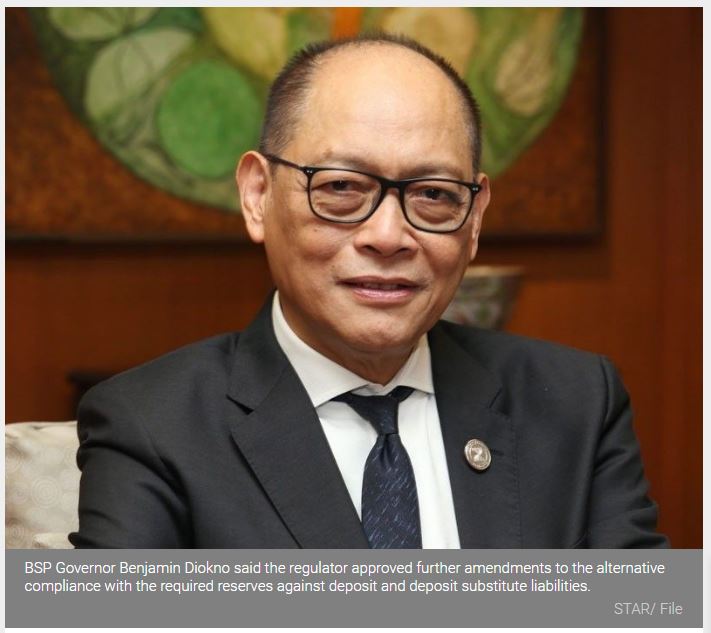Philippines: Bank reserve rules eased anew
MANILA, Philippines — Loans extended by banks to large enterprises that recorded a 25 percent drop in gross receipts and are unable to pay financial obligations due to the pandemic are now considered as alternative compliance with the reserve requirements, according to the Bangko Sentral ng Pilipinas.
BSP Governor Benjamin Diokno said the regulator approved further amendments to the alternative compliance with the required reserves against deposit and deposit substitute liabilities.
Under Circular 1100, Diokno said banks and financial institutions could use loans extended to business enterprises hardest hit by the pandemic as part of their compliance with the reserve requirements.
“A significant decline in gross receipts shall refer to at least a 25 percent decline in gross receipts for one calendar quarter. A critically-impacted business shall include the transport industry, tourism industry and export-import industry,” Diokno said.
Under the previous guidelines, loans to enterprises that experienced at least a 50 percent decline in gross receipts could be used as alternative mode of compliance to the required reserves.
Furthermore, Diokno said banks may continue to utilize past due or non-performing loans to MSMEs and large enterprises as alternative compliance with the reserve requirements for an additional 30 days from the date the obligations become past due or non-performing, whichever comes first.
As part of COVID-19 response measures, the BSP allowed banks to count loans extended to large enterprises as well as micro, small and medium enterprises (MSMEs) as part of their compliance with their reserve requirements .
The BSP issued Circular 1083 in April allowing peso-denominated loans granted to MSMEs that are not past due or non-performing after March 15 as alternative mode of compliance with the reserve requirements.
It also issued Circular 1087 in May allowing peso-denominated loans that are not past due or non-performing granted to large enterprises after March 15 as compliance with the required reserves.
The BSP said credit to these firms would be considered as alternate reserve compliance if the business is not part of a conglomerate, has an asset size of more than P100 million and has 200 or more employees.
The temporary measure, which allows banks to use additional loans to MSMEs and large enterprises severely affected by the pandemic as alternative compliance to the reserve requirement ratio, has been extended until the end of 2022.
The extension gives banks and quasi-banks more time to study the risks of extending loans to MSMEs and large enterprises severely affected by the pandemic.
According to the BSP, loans extended to MSMEs and large enterprises that were used by banks as compliance to the required reserves reached P120 billion as of Aug. 20.
The BSP requires banks to keep a minimum amount of cash reserves with the central bank determined by the amount of deposit liabilities owed to customers.
As part of measures to soften the impact of the COVID-19 pandemic on the economy, the BSP slashed the reserve requirement ratio for big banks by 200 basis points to 12 percent, for mid-sized banks by 100 basis points to three percent, and for small banks by 100 basis points to two percent.
Source: https://www.philstar.com/business/2020/10/12/2048831/bank-reserve-rules-eased-anew


 English
English




